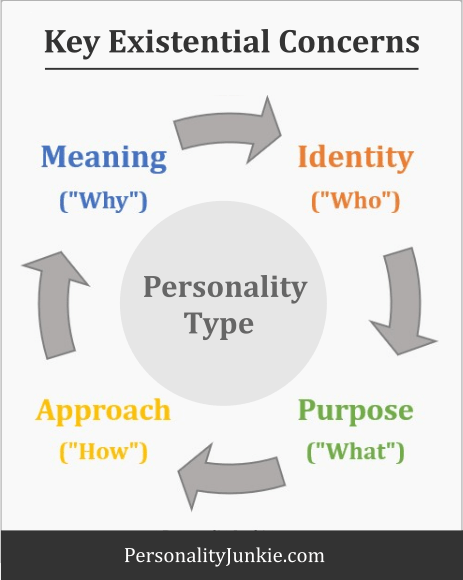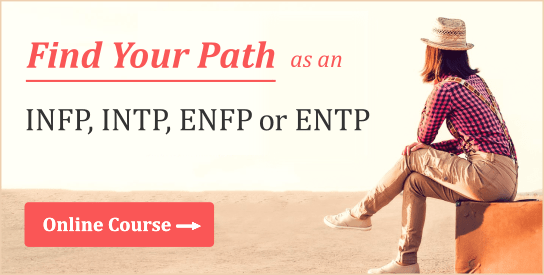
Who am I? What is my purpose in the world? What’s the meaning of life in general and of my life in particular? These are some of the key existential questions we wrestle with over the course of our lives.
As the name implies, existential questions—or what are sometimes called life’s “big” questions—speak to concerns about our existence, both individually and collectively, including its ultimate meaning and purpose.
What distinguishes existential questions from other sorts of questions is their high level of perceived import. Due to their felt importance, we consider them “ultimate” or “foundational” questions. We sense that how we decide to answer them will impact everything we do, informing our deepest values and path in life.
Personality type plays a critical role in shaping our answers to existential questions, serving as a “lens” through which we understand ourselves and the world. In most cases, this lens operates implicitly, coloring our perspectives prior to their appearance in consciousness. This lends credence to the notion (also one of my favorites quotes) that “we don’t understand the world as it is, but as we are.” Even broad ideologies and political preferences bear the fingerprints of personality type.
In addition to its subconscious effects, type can shape our responses to big questions through more conscious channels. For instance, as we will soon discuss, type can play a key role in helping us clarify our identity. How we respond to the “Who am I?” question hinges partly on our answer to “What type am I?”
For the remainder of this post, we will look at four of life’s big existential questions, which broadly take the form of why, who, what, and how, as well as some ways in which type might influence how we approach or respond to them.
“Why” Questions (Meaning)
Whenever we ask “why” we are looking to understand the intent or meaning behind an action. Here are some commonly asked “why questions”:
- Why does something exist rather than nothing?
- Why are we here? Why am I here?
- Why should I persist or keep trying?
One of the defining features of human beings is our concern for deep or ultimate meanings. Taking notice of the laws of cause and effect, as well as the ostensible role of intentions in mediating action, we extrapolate and begin wondering about ultimate causes and intentions. Hence, the notion of God as a potential “first cause” or ultimate source of intention.
In addition to concerns about ultimate causes, we’re also attuned to gradations of meaning in daily life. Namely, we consider certain ideas, experiences, or activities inherently more meaningful than others. Psychologist Abraham Maslow talked a lot about peak experiences, which are perceived as distinctly more salient and meaningful vis-à-vis “ordinary” experience. Armed with this knowledge, we naturally seek out opportunities for deeper or more intense forms of meaning which we experience as pleasurable.
All personality types must ultimately answer life’s big why questions, even if only implicitly. However, because intuition plays a central role in philosophical thinking, intuitive (N) types will typically spend more time pondering and wrestling with them. They are less likely to readily accept conventional answers, preferring to independently develop their own perspectives.
Who Am I? (Identity)
In many respects, modern life insists that we partake in the practice of self-definition. This includes explicating our personality characteristics, as well as our beliefs, values, interests and abilities. Collectively, these things inform and comprise our identity.
Formulating an identity involves a concern for both similarity and difference. On the one hand, we want to know what distinguishes us from others, that is, what makes us unique. On the other hand, we don’t want to be different to the point of having nothing in common with other people, which may give rise to feelings of alienation and loneliness.
As touched on earlier, personality typology can play a significant role in shoring up our identity. Knowing and understanding our type can help us pinpoint ways in which we resemble and differ from others. Typology also keys us into deep psychological structures and blindspots that are difficult to see through introspection alone. It can thus serve as a sort of shortcut to self-knowledge.
That said, type does not give us the full story of who we are. Our identity is also informed by myriad historical, cultural, and familial influences. However, type does affect how we understand and respond to these external factors. It’s a built-in lens through which we perceive and evaluate ideas and experiences.
What Should I Do? (Purpose)
Existential questions regarding purpose are closely related to those involving meaning and identity. By formulating a life purpose, we are attempting to harness and integrate our identity with what we find most meaningful. In our Finding Your Path online course, we underscore the importance of, and methods for clarifying, your identity and purpose.
Despite their overlaps, purpose is more action and goal-oriented than identity. It is a vocation that aligns with our identity, beliefs and values. By incorporating what we hold most dear, it engenders greater enthusiasm and inspiration than other activities might, which is why purpose is often used interchangeably with the term passion.
Due to the complexities and information overload of modern life, it can prove difficult to zero-in our purpose. But as we saw with identity, knowing your personality type can help expedite the process. By understanding the innate strengths of our type, we can gain insight into our optimal role in the world. Our article, The 3 Roles of the INFJ, is a good example of the role of type in informing our purpose.
How Should I Live? (Approach)
For millennia, philosophers and other reflective souls have wrestled with the question: “How should I live?” Underlying this question is the assumption that there is a way or method of living optimally as a human being. Many thinkers concluded that approaching life with a particular attitude or mindset was the key to the well-lived life. Others highlighted the importance of moral action, such as helping others or faithfully executing one’s duties.
If we fast-forward to modern life, we see greater emphasis being placed on the happiness of the individual, which includes some of the things we’ve already discussed: meaning, identity, purpose, etc.

Psychologist Mihaly Csikszentmihalyi has contributed another element to the discussion with his notion of flow states. In his view, we are at our best when we are deeply absorbed in something and experiencing flow. Hence, part of the answer to the “how should I live” question is apt to involve regularly cultivating a state of flow. And this is where everything comes full circle, since we’re most apt to find flow when engaged in activities that are meaningful and consistent with our identity and purpose.
Unfortunately, this is not always as easy as it sounds. Even if we know who we are and what’s most important to us, meaningful flow is not guaranteed. And this is why things like effort, persistence, and effective habits are also required. Otherwise, we’re prone to give up too soon, forfeiting opportunities for greater meaning and satisfaction.
That said, it can be hard to put forth the necessary effort without some measure of hope for a meaningful outcome. This suggests that all of the existential questions are interrelated and therefore none of them can be ignored. It can be difficult to produce and maintain positive momentum if even one of them is off kilter. Fortunately, once they’ve all been addressed and are working together, their symbiosis paves the way for an abundance of flow and meaning.
If you’re wrestling with existential questions and want to better understand yourself and your direction in life, be sure to explore our online course: Finding Your Path as an INFP, INTP, ENFP or ENTP.
Related Resources:
INTP & INFP Identity-Seekers & Creatives
Self-Discovery in Modern Life: How Our Choices Reveal Our Identity

Dan says
Because it took me decades to understand I was an INTP from birth on, I missed so many cues, hints, and nudges from my inner voice. Consequently, I’ve rarely experienced the “meaningful flow”. I know it’s there somewhere, but it’s not flowing. It’s more like pond water at the moment. Perhaps a drip, or even a “stirring” from time to time. Nonetheless, I like that -> meaningful flow”. (Makes me think of the 19th century American transcendentalists.) So now what? Do I need to call the spiritual roto-rooter? Maybe I need scoped? Use some “Braino”? Emoto-plunged? 😊 Thanks for the article, AJ!